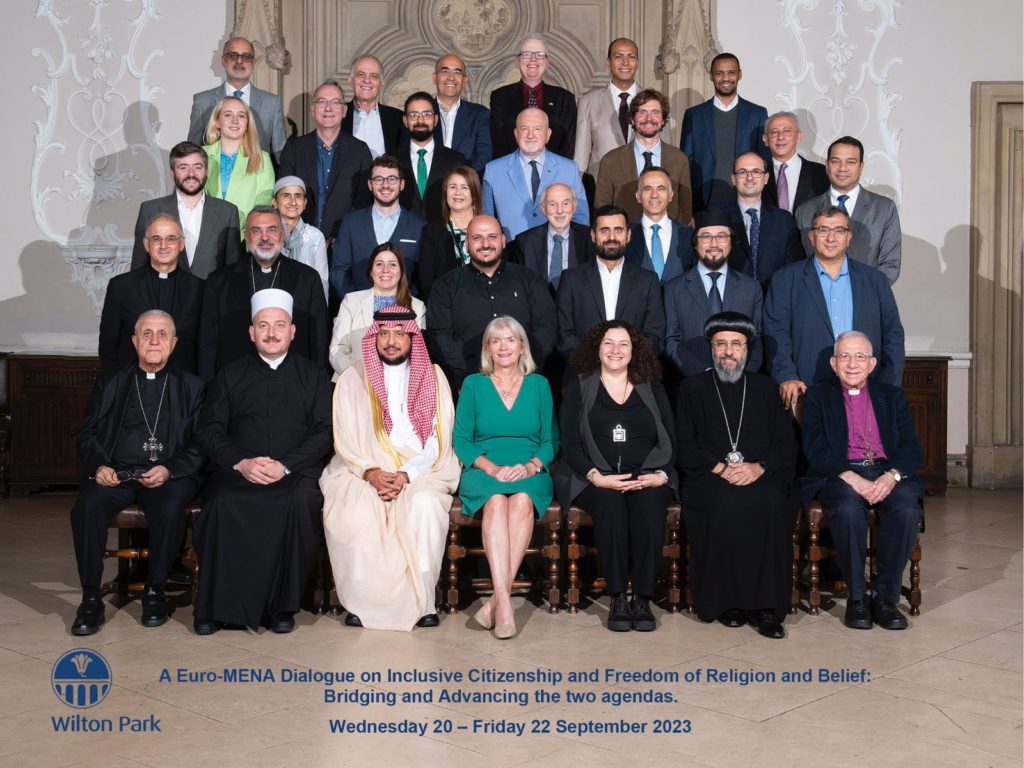Attalaki firmly believes that the absence of Freedom of Religion and Belief (FoRB) and Inclusive Citizenship constitutes a pressing regional and global challenge affecting millions of individuals from diverse countries, ethnicities, religions, and cultures. This void acts as a catalyst for socioeconomic discrimination and segregation, leading to heightened inequality, resentment, and social unrest. Consequently, there is an urgent imperative to advocate for both FoRB and Inclusive Citizenship as pivotal elements in achieving peace and coexistence. This pertains not only to nurturing harmony within increasingly diverse societies but also to fostering amicable relations between them.
In line with this perspective, Attalaki actively participated in the Euro-MENA Dialogue on Inclusive Citizenship and Freedom of Religion and Belief: Bridging and Advancing the two agendas was held at Wilton Park in Wiston, UK from 20-22 September, 2023. The conference was the second in a proposed three-part cycle of dialogues aiming to explore the relationship between Inclusive Citizenship and Freedom of Religion and Belief and chart a common Euro-MENA agenda based on them. The conference was jointly sponsored by the British and Italian Governments, the Adyan Foundation and Globethics, and Wilton Park.
The first meeting in March 2023 convened 40 faith leaders and policy experts in Frascati, Italy, setting the stage for the initiative’s overarching goal: to view FoRB and Inclusive Citizenship not as isolated pursuits but as interlinked dynamics with shared objectives. Acknowledging that FoRB and Inclusive Citizenship represent complementary facets, it became clear that progress in one realm is intricately tied to progress in the other. Moreover, common challenges faced by both agendas were identified, strengthening the case for collaborative and collective action.
The second dialogue in Wiston House engaged 40 faith leaders from Europe and the MENA region to craft an inter-religious Common Document. This document will articulate a shared understanding of and religious engagement with FoRB and Inclusive Citizenship, offering recommendations that factor in the nuanced local realities and challenges of the Euro-MENA context.
In the two sessions representatives of different religious communities and organizations sought to define the vision and goals of the conference. “Peace” was often invoked in this context as a way to name and connect the various aspirations of the group. As one of the participants put it, “There is only one goal. It is peace.” For a start, and towards a common agenda, “peace” was used to express the desire to build a society where diverse peoples could live together well, in flourishing coexistence. “Peace” was also used to signify that which the group sought to mobilize against, including violence and armed conflict, especially violence in the name of religion.
The group also sought to bring recommendations to policy-makers on how to strengthen rights and freedom and political and economic development for those who did not have them. Various motivations of the group were named in this regard. Thus, the group sought to ease the conditions of the marginalized and those without rights; to be a force for justice; to build more opportunities for youth and women; to work against the discrimination of religious communities and diverse religious others; to generate social cohesion and equality. “Peace,” therefore, represented a response to the violence present in global and regional conflicts; to internal disorder and social disintegration; to the plights of migrants; to the oppression of women and the exclusion of youth; to the relentless destruction of the environment; and to the structural conditions of poverty.
“Peace” might also indicate a prevalent religious sentiment which identified the sacred responsibility of religious communities and traditions to build more inclusive, flourishing societies. That religious communities and traditions held specific resources, energies and impulses to “carry forward hope for reconciliation, peace and justice,” as one participant put it. Others spoke about the role of religious communities and leaders as a moral voice or conscience and as holding a responsibility to model an ideal society for others.
In this vein, “Spiritual Solidarity” and “Social Cohesion” were also the central focus of multiple reflections, as representing ideals and values that religious leaders were especially well-placed to (re)generate within society and politics. Here many participants made reference to the Document on Human Fraternity signed by Sheikh Ahmed al Tayeb of al Azhar and Pope Francis. As one participant remembered, the full title of that document read “Human Fraternity for Peace and living Together,” and proposed this as the common task of the group, that is to say, to mobilize solidarity and action that made living together in peace more probable.
Number of participants read the global crises of the world as reflecting religious crises of some kind. Religious leaders, it was argued, were called to be custodians of a message built on love of God and love of neighbor. As such, they should offer society a vision of spiritual renewal grounded in social and individual commitments to live together in “God-willed diversity.”
In conclusion, Attalaki’s involvement in the Euro-MENA Dialogue on Freedom of Religion and Inclusive Citizenship signifies a collective commitment to bridge the gap between these two critical agendas. It recognizes that they are not separate pursuits but interconnected facets of a shared vision for a harmonious society. As this dialogue series progresses, it holds the promise of translating discussions into concrete actions that will bring positive change to the Euro-MENA region, fostering a future where peace and coexistence flourish.



